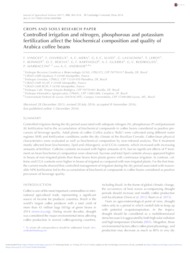Controlled irrigation and nitrogen, phosphorus and potassium fertilization affect the biochemical composition and quality of Arabica coffee beans.
Controlled irrigation and nitrogen, phosphorus and potassium fertilization affect the biochemical composition and quality of Arabica coffee beans.
Author(s): VINECKY, F.; DAVRIEUX, F.; MERA, A. C.; ALVES, G. S. C.; LAVAGNINI, G.; LEROY, T.; BONNOT, F.; ROCHA, O. C.; BARTHOLO, G. F.; GUERRA, A. F.; RODRIGUES, G. C.; MARRACCINI, P.; ANDRADE, A. C.
Summary: Controlled irrigation during the dry period associated with adequate nitrogen (N), phosphorous (P) and potassium (K) fertilization led to the accumulation of biochemical compounds in coffee beans considered as positive precursors of beverage quality. Adult plants of coffee (Coffea arabica ‘Rubi’) were cultivated using different water regimes (WR) and fertilization conditions under the dry climate of the Brazilian Cerrado. Coffee-bean physical characteristics were evaluated as well as biochemical composition by near-infrared analysis. The K treatment mostly affected bean biochemistry, lipid and chlorogenic acid (CGA) contents, which increased with increasing amounts of fertilizer. Caffeine contents increased with higher amounts of N, but no significant effects of P treatment on bean biochemical composition were observed. Sucrose and total lipid contents always appeared higher in beans of non-irrigated plants than those beans from plants grown with continuous irrigation. In contrast, caffeine and CGA contents were higher in beans of irrigated as compared with non-irrigated plants. For the first time, the current results showed that controlled management of irrigation during the dry period associated with reasonable NPK fertilization led to the accumulation of biochemical compounds in coffee beans considered as positive precursors of beverage quality.
Publication year: 2017
Types of publication: Journal article
Unit: Embrapa Cerrados
Observation
Some of Embrapa's publications are published as ePub files. To read them, use or download one of the following free software options to your computer or mobile device. Android: Google Play Books; IOS: iBooks; Windows and Linux: Calibre.
Access other publications
Access the Agricultural Research Database (BDPA) to consult Embrapa's full library collection and records.
Visit Embrapa Bookstore to purchase books and other publications sold by Embrapa.

